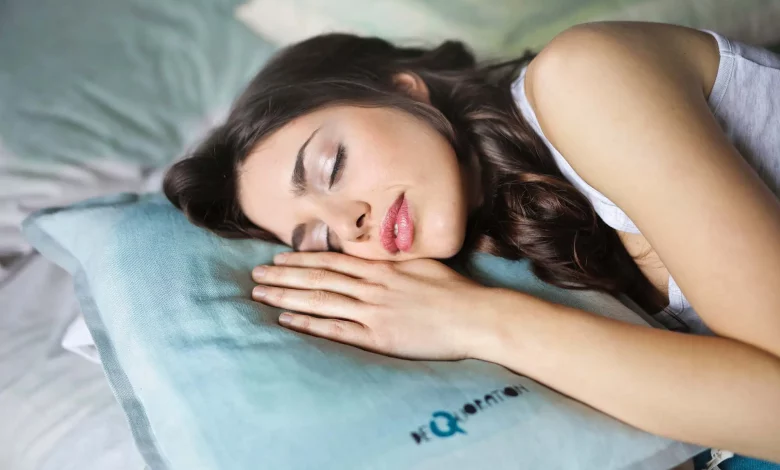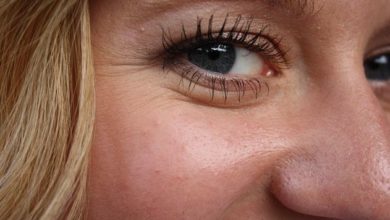
Sleep, this moment when time stops for our consciousness and where essential functions such as breathing and digestion take place to keep us alive.
In our article on sleep, we tell you how to get back to sleep quickly and what happens to your body each night when you are asleep.
The composition of our sleep
A full night’s sleep is made up of several successive stages, which we call sleep phases. Indeed, a night’s sleep begins first with light sleep, followed by deep sleep and ending with paradoxical sleep .
Each of these phases of sleep tends to activate specific areas of our brain and the succession of these three phases of sleep constitutes a sleep cycle.
The latter generally lasts 90 minutes and is repeated four to six times during the night. Focus on the different phases of sleep:
Phase 1: Falling asleep
The night’s rest begins with the transition from wakefulness to sleep. During this phase, you breathe more slowly, your muscles relax, your body temperature and heart rate decrease. Due to muscle relaxation, some people may experience spasms when falling asleep.
Phase 2: Light slow-wave sleep
This phase of sleep occurs at bedtime or when we wake up briefly during our sleep. During this phase breathing and heart rate slow down, muscles relax and body temperature decreases. The body is between sleep and wakefulness and it is easy to be awakened.
The light sleep phase represents almost 50% of sleep time during the night. This phase of sleep tends towards an overall reduction in the activation of brain areas, it therefore corresponds to a period of rest for the brain .
Phases 3 and 4: Deep and very deep slow-wave sleep
It is during these two phases that sleep is the deepest, they represent approximately 20% of the night . Deep slow-wave sleep is the phase of sleep during which we sleep most deeply. The body recovers from physical fatigue, it secretes what it needs, strengthens its immune system and renews its cells.
Breathing and pulse are slow and body temperature is low. The whole organism is at rest. Deep slow-wave sleep helps cleanse the brain and consolidate memory . Information deemed relevant acquired during the day is fixed in memory and that considered less important is deleted.
It is during the deep slow-wave sleep phase that sleep disorders occur in particular .
Phase 5: Paradoxical sleep
The brain regains activity, breathing and heart rate increase, the eyes begin to move under the eyelids. During this phase of sleep, the body oscillates between sleep and wakefulness: brain activity is strong, but the muscles are relaxed.
It is during the paradoxical sleep phase that the most elaborate dreams occur . This stage represents between 20 and 25% of the night . The body recovers from nervous fatigue thanks to dreams, the emotions felt during the day are categorized: those to remember, those less important, happy or traumatic events.
This phase of sleep is linked to emotion . REM sleep is involved in creativity and problem solving . This last phase of sleep is followed by the waking phase.
The importance of sleep
It is therefore during sleep phases 3 and 4 that sleep disorders occur. Sleep disorders, also called insomnia, characterize people who cannot sleep in sufficient quantity and quality. There are several types of insomnia: some are occasional and others chronic.
Some insomnia is characterized by difficulty falling asleep , others by nighttime awakenings or even by a feeling of non-refreshing sleep .
And if we spend almost a third of our lives sleeping, it’s not without reason! Sleep actually produces multiple effects on the functioning of our body, such as the maturation of our nervous system , metabolism , cognitive performance [ 1] , the secretion of certain hormones , cellular repair and the effectiveness of our immune system. [ 2 ] .
In addition, sleep also plays a major role on concentration and memory , mood and emotions [ 3 ] , reducing stress and anxiety and even on fertility . In the following paragraphs, we reveal everything you need to know to sleep well .
How many hours of sleep do we need?
So how can you manage to sleep and thus fight against insomnia? This is the question asked by 1/4 of French people who complain of lacking sleep, while 1/3 of them say they suffer from sleep disorders. [ 4]
According to specialists at the Sleep Foundation [ 5] , having enough sleep simply means being able to function until the end of the day, without feeling tired or drowsy. The average sleep needs of the population by age group are listed in the attached graph.
Sleep needs decrease with age : newborns need 14 to 17 hours of sleep per day, school-age children need 9 to 11 hours, and adolescents need 8 to 10 hours. From the age of 18, sleep duration should be at least six hours – 7 to 8 hours is the optimal duration.
Upper limits are also set: adults should sleep a maximum of 10 to 11 hours, and no more than 9 hours from the age of 60, because too much sleep can also be bad. One study came to the following conclusion: people who regularly sleep longer feel that their verbal skills and logical thinking are impaired. [13a]
Neurotransmitters and sleep hormones

Neurotransmitters and hormones that regulate sleep
When you fall asleep, the tension in your muscles decreases, as does your body temperature, heart rate, and blood pressure. You breathe more slowly and your gastrointestinal system goes into rest mode.
Other mechanisms in your body, however, are overworked, including hormone production. And if you’re wondering what to do for sleep, it’s worth noting that there are various essential hormones and neurotransmitters that promote good sleep and allow you to sleep well at night.
Melatonin, the “sleep hormone”
The most famous is undoubtedly melatonin, the “sleep hormone” which provides temporal cues to our body (day/night) to put it in phase with the environment.
When our eyes perceive light, melatonin synthesis is inhibited, leading to difficulty falling asleep. Conversely, when it is released at the start of the night, it promotes the onset of sleep .
Although melatonin is also present in food, it is usually only in very small amounts.
GABA Between dream and reality
GABA (gamma-aminobutyric acid) is the most important neurotransmitter in the central nervous system. It is an amino acid best known for its relaxing effect on the nervous system , but it is also an anxiolytic [ 6] which soothes states of anxiety and ensures muscle relaxation.
GABA induces the calm necessary for falling asleep . The body produces GABA from L-glutamine, an amino acid found in many foods.
Serotonin: the happiness hormone
Serotonin is both a hormone and a neurotransmitter. It is important for information processing and, as a precursor to melatonin , it indirectly influences sleep, or more precisely the sleep-wake cycle. In addition, serotonin affects mood, which is why it is also called the » happiness hormone « .
Tryptophan is needed to make serotonin. So make sure you take enough tryptophan to sleep well. The same goes for the cofactors that contribute to serotonin production: vitamin B6, vitamin D and omega-3 fatty acids. [10]
What to take to sleep? Sleep micronutrients

Having trouble falling asleep is a common problem. This is why many people turn to natural and synthetic sleeping pills sold in pharmacies or drugstores. But what actually helps you fall asleep? To be able to answer this question and make recommendations on sleep-promoting foods and home remedies to help you fall asleep, we must first take a look at micronutrients for better sleep :
- Tryptophan is an amino acid beneficial for sleep . [7] Indeed, it is a precursor of serotonin, itself a precursor of melatonin, the sleep hormone. It is therefore important to monitor your intake of the amino acid tryptophan.
- Glutamine : this amino acid helps with sleep by allowing the production of the neurotransmitter GABA .
- Magnesium can also help you sleep well. It has relaxing and soothing properties on our nervous system and muscles, which can help us fall asleep more quickly. In addition, magnesium is also a cofactor in the production of serotonin and it also helps fight the stress hormone , cortisol. [8] This precious mineral also increases the level of GABA, a neurotransmitter that promotes sleep. So if you are wondering how to sleep better, there is no doubt that this mineral, in the form of food supplements or foods rich in magnesium for example, can prove beneficial. [9]
- Potassium: helps relax muscles and thus works in correlation with magnesium to help you sleep better.
- Calcium is an essential mineral for the production of tryptophan.
- B group vitamins : notably vitamins B3, B6, B9, B12, are essential for the production of serotonin and melatonin. They also participate in the balance of the nervous system . Vitamin B6 in particular facilitates the assimilation of magnesium and thus maximizes its effects. It also contributes to the production of GABA.
- Omega -3s will optimize the transmission of nervous messages and be useful in promoting good sleep but also better energy during the day. Overall, higher blood levels of omega-3 fatty acids (DHA) are significantly associated with better sleep. [10]
- Adaptogenic substances : adaptogenic plants, such as rhodiola rosea, ashwagandha, kudzu or St. John’s wort, help to promote relaxation of the nervous system in the event of stress and to promote the body’s recovery mechanisms, such as relaxation and sleep. [11]
You can easily get all of these substances in your diet – you just need to know how. We have created a list of foods to sleep well especially for you.
Sleep and diet: what to eat in the evening to sleep well?
What are the foods to sleep well? Are there recipes and simple home remedies to help you fall asleep? Questions that many of us ask ourselves who would like to sleep better and thus benefit from all the benefits of restful sleep on our health. In the previous paragraph we told you the most important nutrients for healthy sleep. We now show you where they are hiding with our list of 10 foods that promote sleep :
- Green vegetables , such as spinach and broccoli
- Fruits , including banana, kiwi and cherries
- Whole grains , such as whole wheat bread
- Legumes , such as lentils and beans
- Oily fish , such as salmon or tuna
- Dairy products , such as cheese
- Nuts , especially cashews
- Seeds , such as chia and sesame
- Herbal teas , especially lavender and chamomile
- Cocoa
1. Green vegetables
Leafy green vegetables like kale, spinach and broccoli contain many essential nutrients that help us sleep well . They contain in particular calcium , vitamin B6 and magnesium and typtophan . So whether in the form of soup, gratin or as an accompaniment, we play Popeye style to sleep like a baby.
By the way: you can also eat fresh vegetables in the evening. The digestibility of raw vegetables varies from person to person and does not depend on the time of day, but on the amount consumed. Test how much you can tolerate. If you have difficulty digesting, eat small portions and chew well.
2. Fruit
If you’re wondering how to sleep, bananas are one of the best foods for sleep. In addition to their undeniable nutritional qualities, they are rich in tryptophan and even constitute the fruit with the highest content of this amino acid. [16] Eating one before bed will also give you a healthy dose of magnesium, vitamin B6, and potassium.
Apart from bananas, you can also eat kiwis before sleeping. In fact, eating two kiwis about an hour before bed could be a trick to sleeping like a baby. [ 18] Kiwi produces positive effects on the quality of sleep: rarer nighttime awakenings, faster falling asleep and longer sleep duration. Benefits which are not that surprising since kiwi is rich in serotonin.
Finally, focus on cherries: cherries are a food rich in melatonin. In addition, the red pigments in cherries, called proanthocyanidins, also help increase the availability of tryptophan within the body. Cherries can therefore help you sleep better . [17]
3. Whole grains
Whole grain products have various properties. In addition to vitamins B1 and B6, whole grains, such as bran, barley and wheat as well as buckwheat, rye, oats and millet , are a significant source of tryptophan, magnesium and potassium.
A high consumption of whole grains can therefore reduce the risk of insomnia . Therefore, consume high-quality whole grain products (whole grain bread, whole grain pasta or brown rice) and avoid products with a high glycemic index, such as white or sandwich bread or non-whole grain pasta. [ 12]
4. Legumes
Legumes include lentils, chickpeas and white or red beans . Rich in B vitamins, tryptophan and glutamine, legumes will help secrete serotonin. These foods rich in fiber, but also in vegetable proteins, are absorbed by our metabolism slowly, the idea being to slightly increase insulin levels, which will have a sedative, but also soothing effect . You can accompany them with vegetables and fish rich in omega-3, to avoid meals that are too fatty and thus improve your sleep . [15]
Note: If you have digestion difficulties, do not eat legumes right before bed and eat them in moderate portions.
5. Dairy products
Who hasn’t heard that warm milk helps you sleep? And it’s not without reason! Warm milk with honey provides a feeling of warmth and comfort and was already considered an ideal natural remedy to promote sleep in our grandmothers’ times.
Dairy products such as milk, yogurt and cottage cheese are recommended in the evening, since they contain tryptophan as well as potassium, calcium and magnesium , natural muscle relaxants necessary for better sleep . [14]
6. Oily fish
Rich in omega-3 fatty acids , fatty fish such as sardines, mackerel, trout, tuna and salmon improve the reception of signals sent by serotonin and should be favored during the evening meal. The omega-3 fatty acids in oily fish also help reduce stress .
Oily fish also contain vitamin B6 , as well as glutamine, tryptophan and potassium. So eating oily fish in the evening can help you sleep. [13]
By the way: Linseed oil, walnut oil, rapeseed oil or hemp oil as well as flax seeds and walnuts can also be used as omega-3 suppliers.
7. Nuts
Among the foods to sleep well, we also find nuts . These are among the foods rich in melatonin, but they also contain B vitamins and magnesium. Cashews , in particular, are rich in tryptophan, while walnuts are an excellent source of potassium, vitamin B6 , and glutamine. The different varieties of nuts are easily included in the evening meal, to garnish soups, salads and bowls for example.
You can also eat nut purees, such as cashew nut puree , which is very versatile in cooking. In addition, nuts are part of good mood foods , which boost our mood.
8. Seeds
Sesame, pumpkin, chia, flax and sunflower seeds are rich in eptophan, but they also contain magnesium, B vitamins and omega-3 fatty acids. Seeds , especially pumpkin seeds, are therefore particularly beneficial for sleep . They can be eaten as is or added to gratins or salads, which they complement perfectly. Of course, it is better to opt for organic quality seeds.
9. Herbal teas
Although we frequently hear about teas for sleeping, this is a common misconception because most teas contain theine, unlike herbal teas, which are therefore much more suitable for promoting sleep and helping you sleep.
Chamomile herbal tea remains a great classic to help you fall asleep and create a special moment of relaxation before slipping under the duvet. Lavender, sage, valerian or mint tea also have relaxing, soothing and sedative properties.
10. Cocoa
Cocoa not only contains tryptophan, but it is also one of the largest dietary sources of magnesium . Whether it’s a cup of hot chocolate or a glass of cocoa soy milk, this natural sedative promises long nights of deep, restful sleep. [19][20]
For optimal benefits, you should opt for 100% natural cocoa powder, without additives and without added sugar.
SOS sleep: 10 simple tips to sleep faster and better

If you have difficulty falling asleep and having quality sleep, do not hesitate to combine these sleep-promoting foods , especially during your evening meals. But in addition to foods for sleeping, there are also some tips to implement every day for quality sleep.
Here are our 10 best tips for sleeping well :
- Sleep and wake up at set times
- Use your bed just to sleep
- Avoid naps during the day
- Eat light, neither too early nor too late
- Avoid stimulants
- Relax
- Exercise regularly
- Forget the screens
- Sleep in silence and darkness
- Pay attention to the temperature of the room
Banish thoughts like « I can’t fall asleep », but instead ask yourself: « Why can’t I fall asleep? Raise awareness about the causes of sleep problems and research suitable tips that you can try immediately This way you can quickly find out what helps you fall asleep By the way: for good sleep hygiene you should always combine different measures . .
Tip 1: Sleep and wake up at set times
How to sleep better at night? Go to bed when you feel sleep signals (yawning, heavy neck, itchy eyes, etc.). If you are not tired, do a relaxing activity while you wait for sleep. Try to get up around the same time in the morning , even on weekends and days off. This will help regulate your body clock , making it easier to fall asleep.
Tip 2: Use your bed for sleeping only
To sleep well, don’t read, watch TV, eat or think about your problems in bed. In short, use your bed only for sleeping . Sexual activity is the only exception to this rule. The bedroom should be quiet, dark, inspiring and calming.
Tip 3: Avoid daytime naps to sleep better at night
To successfully get to sleep in the evening, avoid taking a nap if you feel very tired during the day, especially if you suffer from insomnia regularly. Napping disrupts your sleep/wake rhythm and will therefore prevent you from sleeping well at night.
Tip 4: Eat light in the evening
Digestion is a process that produces heat, which in turn affects the quality of sleep. We therefore recommend that you avoid high-calorie meals just before bedtime. Replace hard-to-digest foods at dinner with light foods. This is the case, for example, with diuretic raw vegetables such as lettuce and cucumber. You should also avoid foods high in animal proteins, simple carbohydrates and fats before going to bed.
It’s best to eat a lighter meal of low-calorie foods in the evening . However, you should not eat directly before sleeping. Eat your dinner as early as possible to give your body time to digest: wait at least an hour or two after eating before going to bed. So you won’t have to sleep on a full stomach. You’ll find low-calorie recipes for a light and delicious dinner on nu3Kitchen.
Tip 5: Avoid stimulants
Although this advice for sleeping is probably already well known to everyone, we repeat it once again: avoid stimulants before going to sleep, or even in the afternoon. Indeed, coffee, tea, sodas and sugary drinks should be avoided for deep and restorative sleep. In addition, caffeine blocks adenosine receptors, a substance produced by the body during wakefulness, which inhibits the functioning of our brain until sleep arrives. It is therefore better to avoid drinking substances rich in caffeine and in particular coffee after 3:00 p.m., to promote good sleep in the evening. [21]
You should also avoid alcohol before sleeping. Even moderate consumption can lead to reduced sleep time and worsened sleep quality.
Tip 6: Relax
Positive thoughts can help you fall asleep. Avoid phrases like « I can’t sleep » because they will only make your problem worse. Instead, find relaxation exercises to help you fall asleep and make them your regular bedtime ritual. There are several techniques – meditation, autogenic training or yoga – that are excellent for falling asleep and are among the most popular methods for inducing sleep. These techniques are important and are not only appreciated by followers of biohacking . Try them and find out what works best for you. This will allow you to fall asleep quickly and relaxed.
Leartn Also : How to improve your cardio? The right training methods and diet
If you still can’t fall asleep after half an hour, get up and do something relaxing in a soft light: read a book or listen to soft music. Light yoga is not only appropriate in the evening before bed, but it can also be helpful if you can’t sleep. Return to bed as soon as you feel tired. When you wake up at night, don’t look at the time. This can make falling asleep even more difficult. Instead, do a relaxation exercise or count sheep – both are calming and have been proven to help you fall asleep.
By the way: do you already know the 4-7-8 method ? This breathing technique, which has its roots in yoga, is also excellent for falling asleep. It gets its name from the rhythm of breathing: inhale for four seconds, hold your breath for seven seconds and exhale for eight seconds. Have you tried breathing exercises to fall asleep?
Tip 7: Exercise regularly
Are you looking for a solution to sleep soundly? It has been proven that practicing physical activity helps you sleep better [22] , by making it easier to fall asleep and achieve restful sleep. It is not obligatory to go running , to go to the gym, to the swimming pool or to tennis, walking at an alert pace is already an excellent physical exercise.
What counts is attendance and regularity : at least 30 minutes every day and a little longer on weekends. The timing of sports training is also decisive with regard to the quality of sleep: practicing sports too late in the evening, i.e. less than 3-4 hours before bedtime, interferes with falling asleep.
Tip 8: Forget the screens
Screens, tablets, computers, mobile phones… New technologies are invading our personal sphere, even moving into our bedroom, thus disrupting our sleep.
Indeed, the blue light produced by screens stimulates the photoreceptors present in the retina by sending a message to the brain that it is still daytime, which has the effect of disrupting our biological clock.
This shifts, or even suppresses, the secretion of melatonin and has the effect of delaying falling asleep and creating multiple awakenings.
So how do you get to sleep quickly? It’s enough to say goodbye to screens in the bedroom at least 1 hour before going to sleep. If that’s impossible for you, at least try putting all electronic devices on silent or turning them off completely.
Tip 9: Sleep in silence and complete darkness
For a truly restful sleep, it is better to sleep in silence and complete darkness . This will help you fall asleep quickly. So close your shutters or curtains and turn off your cell phone when you go to bed, or at least put it on silent mode and turn off the light signal.
This way, you can sleep peacefully and wake up refreshed and full of energy the next morning.
Tip 10: Pay attention to the temperature of your room
Another tip for sleeping better at night: an optimal temperature in your bedroom. A room between 16 and 18°C will in fact both promote sleep and facilitate breathing. Conversely, when the temperature of the room is lower or higher than this average, the quality of sleep is affected.
Exposure to cold or heat leads to an increase in awakenings during the night, a reduction in light and deep slow-wave sleep and a fragmentation of paradoxical sleep.
This phenomenon should not be taken lightly since 42% of French people say they are likely to be woken up by a sound that is too high or, on the contrary, too low in their bedroom. [23]
Summary: what should I do if I can’t sleep?
For restful sleep, it is important to have an undisturbed night. If you have sleep problems, there are tips and sleep aids to help you sleep better: autogenic training to fall asleep, the 4-7-8 method or getting enough exercise.
In any case, good sleep hygiene combined with a healthy lifestyle and a balanced diet is the best way to sleep well at night. Develop your own sleep rituals and invent exercises. Write down your favorite tips for falling asleep and find your own sleeping technique – so you will feel the first successes after a short time.





